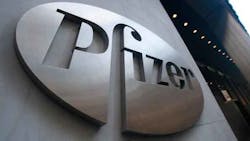New Treasury Law Is Pfizer's Bitter Pill
Pfizer and Allergan have been acting as if their $160 billion merger was a sure thing, despite the fact that the deal -- designed in part to net Pfizer a lower Irish tax rate -- pretty clearly stuck in the craw of the Obama administration.
Sure enough, Monday brought a set of new rules from the Treasury Department that seem tailor-made to derail PfizerGan and muck up its potential tax benefits. The deal may still survive, but Allergan shares, down 16 percent Tuesday, are trading as if the merger is ashes in a $400 million urn on a mantelpiece.
Pfizer is in an awkward spot in any case. This deal was its big idea to move past a period of anemic growth, and it will be hard for it to come up with something else as appealing or transformative. After focusing its hopes on this strategy for so long, it'll be tough to Pfizer to move on. But it may not have a choice.
Pfizer and Allergan are scrambling to find a way to keep the deal viable. That'll be tough -- these rules attack their deal with a bureaucratic scalpel. The proposed rules specifically seek to limit inversion activity from firms that have made such deals in the past three years. That time period neatly encompasses some of Allergan's major acquisitions. The companies have the option of fighting to the death if they really want to. They could argue Treasury is exceeding its authority to act without congressional approval, and they might win. But that's an unappealing option, possibly involving years of litigation and uncertainty.
The two could also substantially restructure the deal, accept a lesser tax benefit, and still go through with it. But Allergan may not be interested in renegotiating. And tax benefits were a major motivator of the deal, which isn't extraordinarily compelling without them, given its price. The deal math always depended on a lower tax rate and big buybacks with offshore cash, according to a Bloomberg Intelligence analysis.
It's also possible Pfizer CEO Ian Read will keep tilting at the inversion windmill. His desire wasn't thwarted by a high-profile failure to buy British pharma giant AstraZeneca, nor by previous government efforts to make such deals less attractive. There also aren't a ton of companies big enough to be feasible targets that don't run into problems with these rules, but there are a few. GlaxoSmithKline might be an option. Another round with AstraZeneca isn't out of the question. And Shire might be big enough once it absorbs Baxalta, but Treasury's new rules seem to mean that recent acquisitions won't factor into the ownership calculations that determine an inversion's tax benefits.
Treasury seems to be systematically destroying every benefit of tax inversions, so any such deal will look drab compared to Pfizer's past visions of relatively unrestricted Irish tax glory. The government seems willing to fling its whole toolbox (and invent new tools) in order to derail specific deals. It may be time for Pfizer to finally throw in the tax towel.
Alternatively, the company could roll up its sleeves and return to conventional M&A for a growth boost. Though Pfizer has some solid new drugs, its late-stage pipeline is not particularly exciting, with several drugs attempting to elbow belatedly into crowded treatment areas. Pfizer's revenue has declined for the past five years, and its forecast for this year is flat. Losing Allergan's rapid growth won't help.
The $160 billion not spent on Allergan would buy a whole lot of small or mid-cap companies that could juice growth now or in the future. Of course, that's no sure route to success. And there's the eternal biotech Catch-22: Early-stage bets are risky, while firms with late-stage or newly marketed drugs are often expensive.
Pfizer could also take an (expensive) crack at a bigger company such as AbbVie that offers both substantial revenue in the near term and a large pipeline. Ironically, Pfizer may end up competing with Allergan in that arena. After Allergan's $40.5 billion deal to sell generic assets to Teva is finalized later this year, Pfizer's would-be merger partner will be in a financial position to return to aggressive M&A, likely focusing on some of the same growth targets.
A deal failure might also hasten Pfizer's long-awaited breakup into two different businesses, one focused on older, established products, the other on newer pharmaceuticals. Such a split would liberate the company's best-performing new drugs from its older products. The Allergan deal was seen as making such a breakup even more attractive, solving worries that the respective businesses might not have enough scale on their own. But it did come with a delay. While investors hoped for a split by 2017, executives said a decision might not be made until the end of 2018. An actual split might not have been legally possible until 2019.
Without Allergan, a breakup could conceivably come much more rapidly.
You can't accuse Pfizer of lacking ambition. It may just need to channel it in a different way.
By Max Nisen
